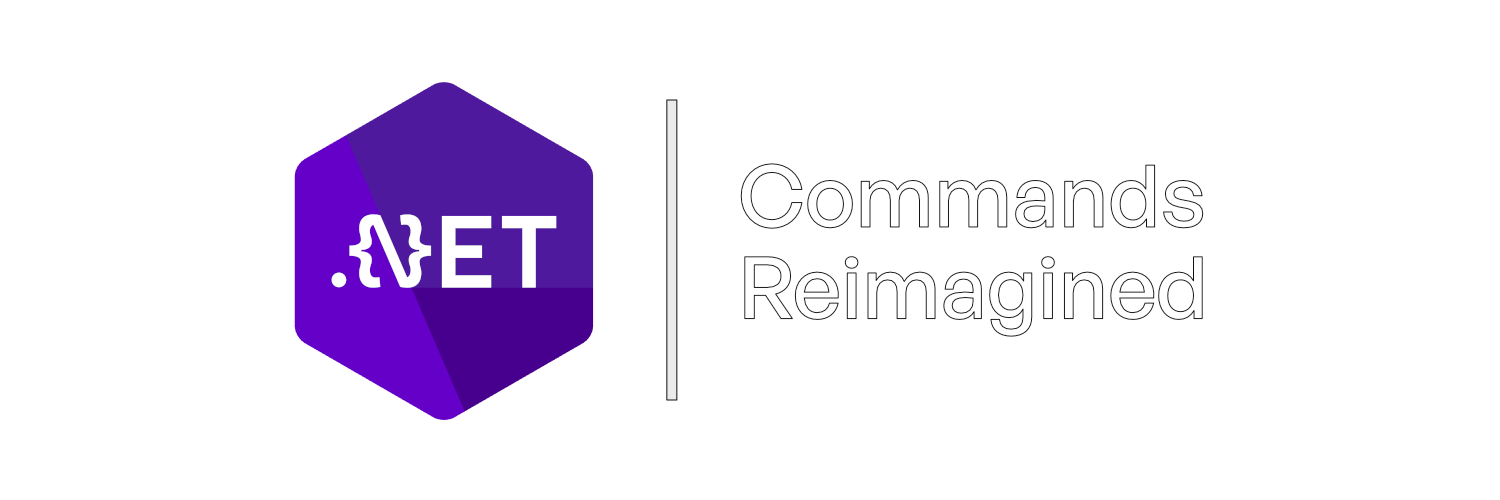Commands.NET.Hosting
2.0.0-alpha.13
See the version list below for details.
dotnet add package Commands.NET.Hosting --version 2.0.0-alpha.13
NuGet\Install-Package Commands.NET.Hosting -Version 2.0.0-alpha.13
<PackageReference Include="Commands.NET.Hosting" Version="2.0.0-alpha.13" />
<PackageVersion Include="Commands.NET.Hosting" Version="2.0.0-alpha.13" />
<PackageReference Include="Commands.NET.Hosting" />
paket add Commands.NET.Hosting --version 2.0.0-alpha.13
#r "nuget: Commands.NET.Hosting, 2.0.0-alpha.13"
#addin nuget:?package=Commands.NET.Hosting&version=2.0.0-alpha.13&prerelease
#tool nuget:?package=Commands.NET.Hosting&version=2.0.0-alpha.13&prerelease

Commands.NET
Consider leaving a ⭐
Do more, with less. With speed, compatibility and fluent integration in mind.
Commands.NET aims to improve your experience integrating input from different sources* into the same, concurrent pool and treating them as triggered actions, called commands. It provides a modular and intuitive API for registering and executing commands.
Browse the wiki for a full overview of the library.
*Sources can range from command-line, console, chatboxes, to social platforms like Discord, Slack, Messenger & much, much more.
Usage
Running a Command
A command is a method executed when a specific syntax is provided. By creating a manager to contain said command, you can run it with the provided arguments.
using Commands;
var command = Command.From(() => "Hello world!", "greet");
var collection = ComponentCollection.From(command).Create();
await collection.Execute(new ConsoleContext(args));
// dotnet run greet -> Hello world!
Creating Command Groups
Command groups are named collections of commands or other command groups. Groups allow for subcommand creation, where the group name is a category for its children.
using Commands;
var mathCommands = CommandGroup.From("math")
.AddComponents(
Command.From((double number, int sumBy) => number + sumBy,
"sum", "add"),
Command.From((double number, int subtractBy) => number - subtractBy,
"subtract", "sub"),
Command.From((double number, int multiplyBy) => number * multiplyBy,
"multiply", "mul"),
Command.From((double number, int divideBy) => number / divideBy,
"divide", "div")
);
var collection = ComponentCollection.From(mathCommands).Create();
await collection.Execute(new ConsoleContext(args));
// dotnet run math sum 5 3 -> 8
Creating Command Modules
Command modules are classes that can contain commands or nested command modules, which themselves can also contain (sub)commands.
using Commands;
public class HelpModule : CommandModule
{
[Name("help")]
public void Help()
{
var builder = new StringBuilder()
.AppendLine("Commands:");
foreach (var command in Manager!.GetCommands())
builder.AppendLine(command.GetFullName());
Respond(builder.ToString());
}
}
...
var collection = ComponentCollection.From(mathCommands).AddType<HelpModule>().Create();
await collection.Execute(new ConsoleContext(args));
// dotnet run help -> Commands: math sum <...> math subtract <...> math ...
Using Dependency Injection
Commands.NET is designed to be compatible with dependency injection out of the box, propagating IServiceProvider throughout the execution flow.
using Commands;
using Microsoft.Extensions.DependencyInjection;
...
var services = new ServiceCollection()
.AddSingleton<MyService>()
.AddSingleton<ComponentCollection>(ComponentCollection.From(mathCommands).AddType<HelpModule>().Create());
.BuildServiceProvider();
var collection = services.GetRequiredService<ComponentCollection>();
await collection.Execute(new ConsoleContext(args), new CommandOptions() { Services = services });
Modules can be injected directly from the provider. They themselves are considered transient, being created and disposed of per command execution.
public class ServicedModule(MyService service) : CommandModule
{
}
Samples
- Commands.Samples.Core
- Manage, create and execute commands in a basic console application.
- Commands.Samples.Console
- Fluent API's, complex execution flow and workflow expansion.
- Commands.Samples.Hosting
- Integrating Commands.NET into the .NET Generic Host infrastructure.
- Commands.Samples.FSharp
- Use Commands.NET in F# projects.
Benchmarks
Benchmark results are found here.
| Product | Versions Compatible and additional computed target framework versions. |
|---|---|
| .NET | net8.0 is compatible. net8.0-android was computed. net8.0-browser was computed. net8.0-ios was computed. net8.0-maccatalyst was computed. net8.0-macos was computed. net8.0-tvos was computed. net8.0-windows was computed. net9.0 was computed. net9.0-android was computed. net9.0-browser was computed. net9.0-ios was computed. net9.0-maccatalyst was computed. net9.0-macos was computed. net9.0-tvos was computed. net9.0-windows was computed. net10.0 was computed. net10.0-android was computed. net10.0-browser was computed. net10.0-ios was computed. net10.0-maccatalyst was computed. net10.0-macos was computed. net10.0-tvos was computed. net10.0-windows was computed. |
-
net8.0
- Commands.NET (>= 2.0.0-alpha.13)
- Microsoft.Extensions.Hosting.Abstractions (>= 9.0.4)
NuGet packages
This package is not used by any NuGet packages.
GitHub repositories
This package is not used by any popular GitHub repositories.
| Version | Downloads | Last updated |
|---|---|---|
| 2.0.0-alpha.15 | 63 | 4/25/2025 |
| 2.0.0-alpha.14 | 95 | 4/25/2025 |
| 2.0.0-alpha.13 | 121 | 4/24/2025 |
| 1.0.0 | 218 | 12/2/2024 |


